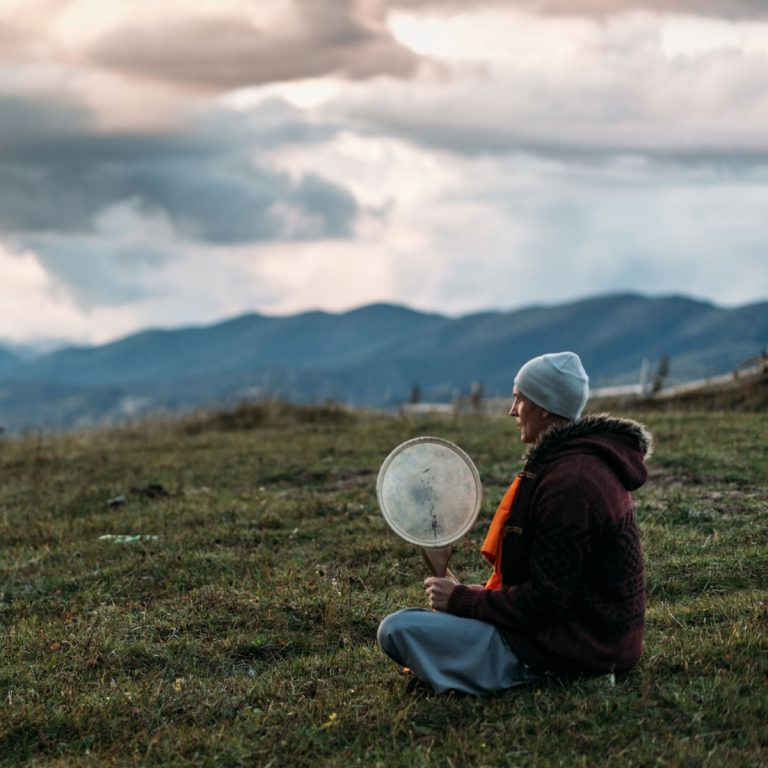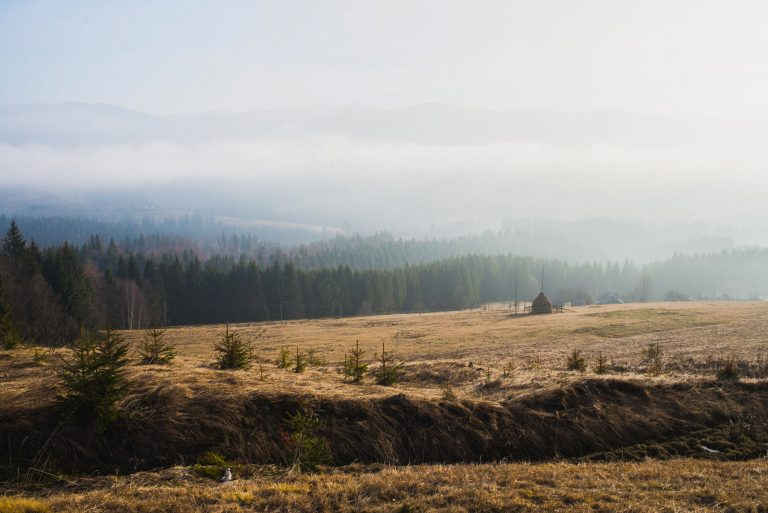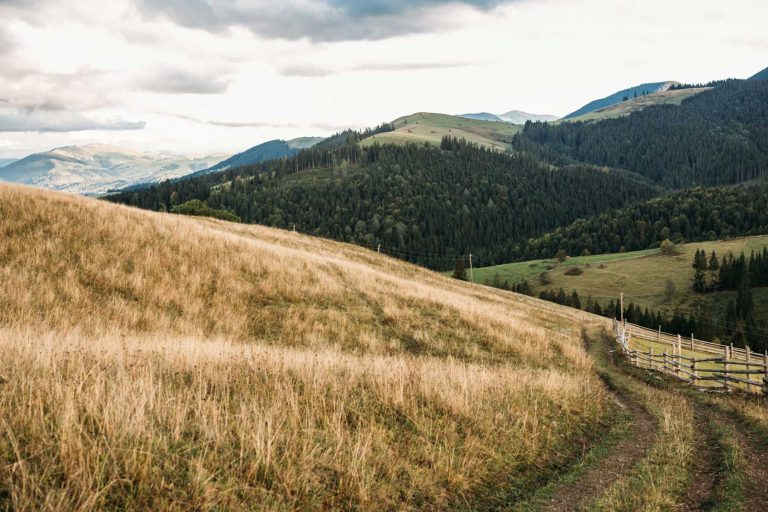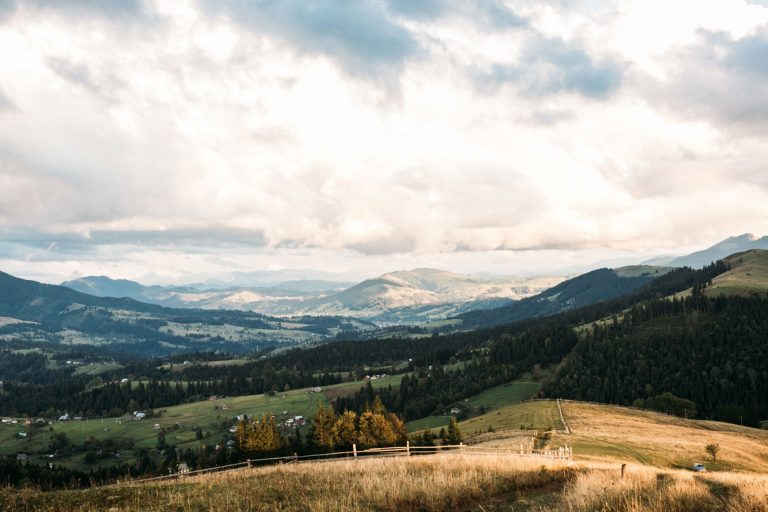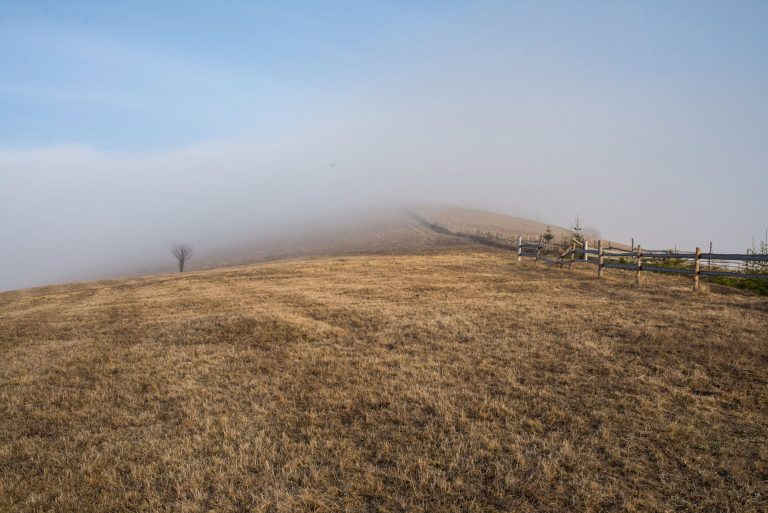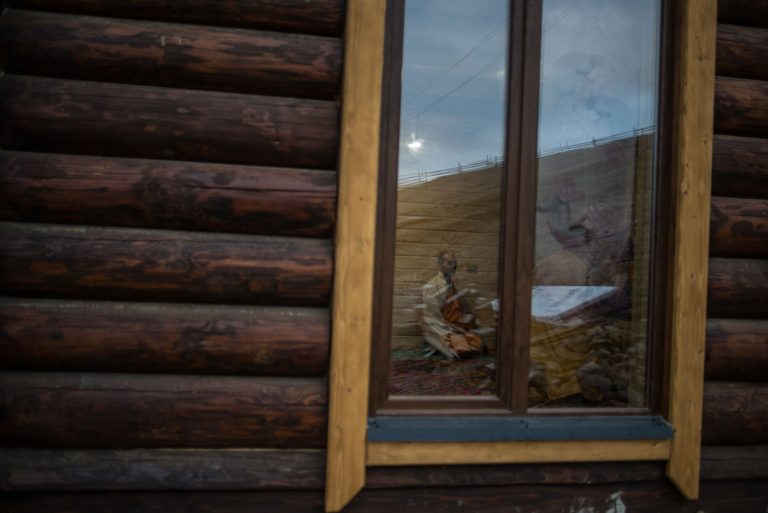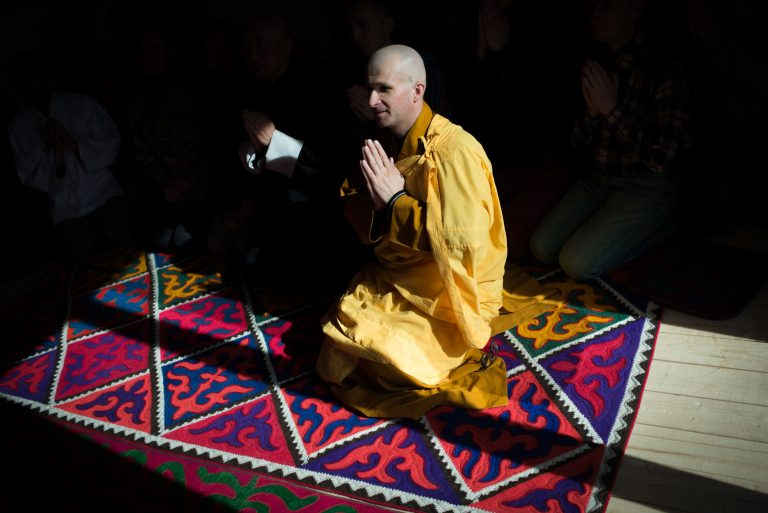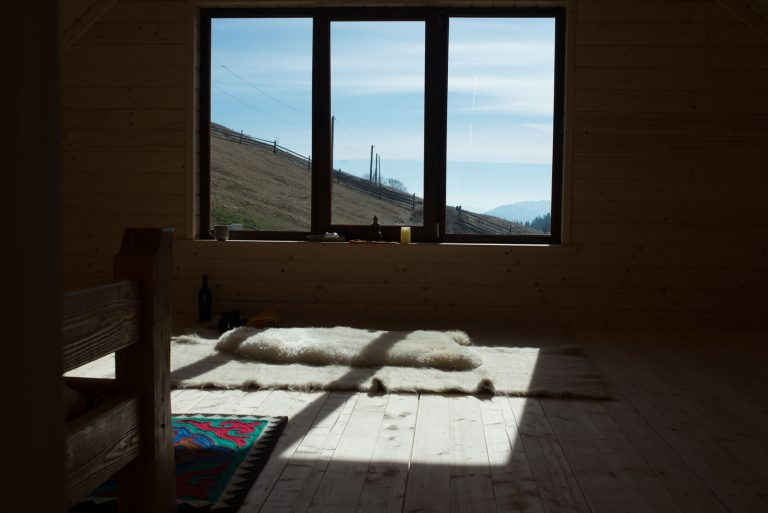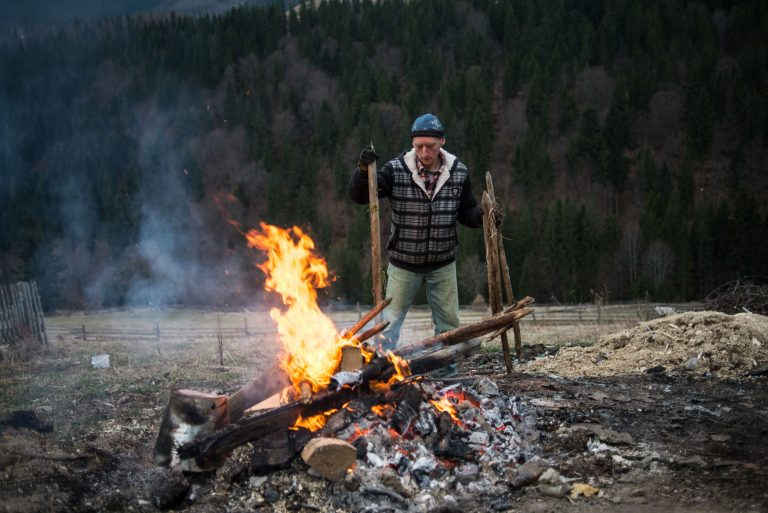One of the oldest Buddhist communities in Ukraine, originating from Donetsk, is located not far from the village of Kryvopillia in the Carpathians. They were compelled to leave their region and move to the Carpathians after the military conflict in Donbas broke out. The monks dream about the war being over and the occupied lands to be returned to Ukraine.
They have shaved heads and wear white gowns with orange cloaks angsa (traditional dress of Biddhist monks — editor). They wake up at dawn and read prayers to the sun. They have unconventional appearance and lifestyles from the standpoint of Ukrainians, however, they live in the Carpathians and speak Ukrainian.
Despite historical affiliation of Ukrainians to Christianity, Buddhism has quite old historical connections with our country. Common fashion for eastern practices got widespread in the second half of the 19th century among the circles of intellectuals. However, there are mentions about connections of Cossacks with Kalmyk Buddhists as early as in the 18th century, due to whom those ideas got to Ukraine.
The first Buddhist religious community was officially registered in Donetsk in 1991. As of 2017 there are more than 59 communities registered. However, this is just an official number, in reality there is way more of them. Before the war, the activity of Buddhist centers in independent Ukraine mostly was focused in Slobozhanshchyna: in Donetsk, Luhansk and Kharkiv regions. After the occupation the adherents of eastern practices had to resettle to different corners of Ukraine. This story is about religious migrants that now reside in the Carpathians, nearby the village of Kryvopillia, Verkhovyna district.

The War
Serhiy Filonenko is the monk of the Lotus Sutra order. He says it is their community that is the oldest in Ukraine. It was founded right after Ukraine proclaimed its independence, and it was registered with the help of Ukrainian theologist Ihor Kozlovskyi who had to stay in Donetsk during the occupation and go into captivity and in December 2017 was released together with other captives.
Serhiy Filonenko is from Donbas, he has lived there his entire life:
— I was born in Donetsk region, but in the village that is way older than Donetsk, Nyzhnia Krynka, it is a Ukrainian village. There was some Cossack outpost or palanka, there is also a river — Nyzhnia Krynka. However, people came and settled there and started digging mines. There was a small miners town and my mother moved there from Luhansk region. That’s where I saw the world. But it’s a steppe region. I love steppes very much. That’s what I lack. Here I do not yet feel that it’s my land.
Palanka
Stands for the administrative-territorial unit (district) of the Zaporizhzhian Sich, equal to the regiment in Hetmanate and headed by a colonel.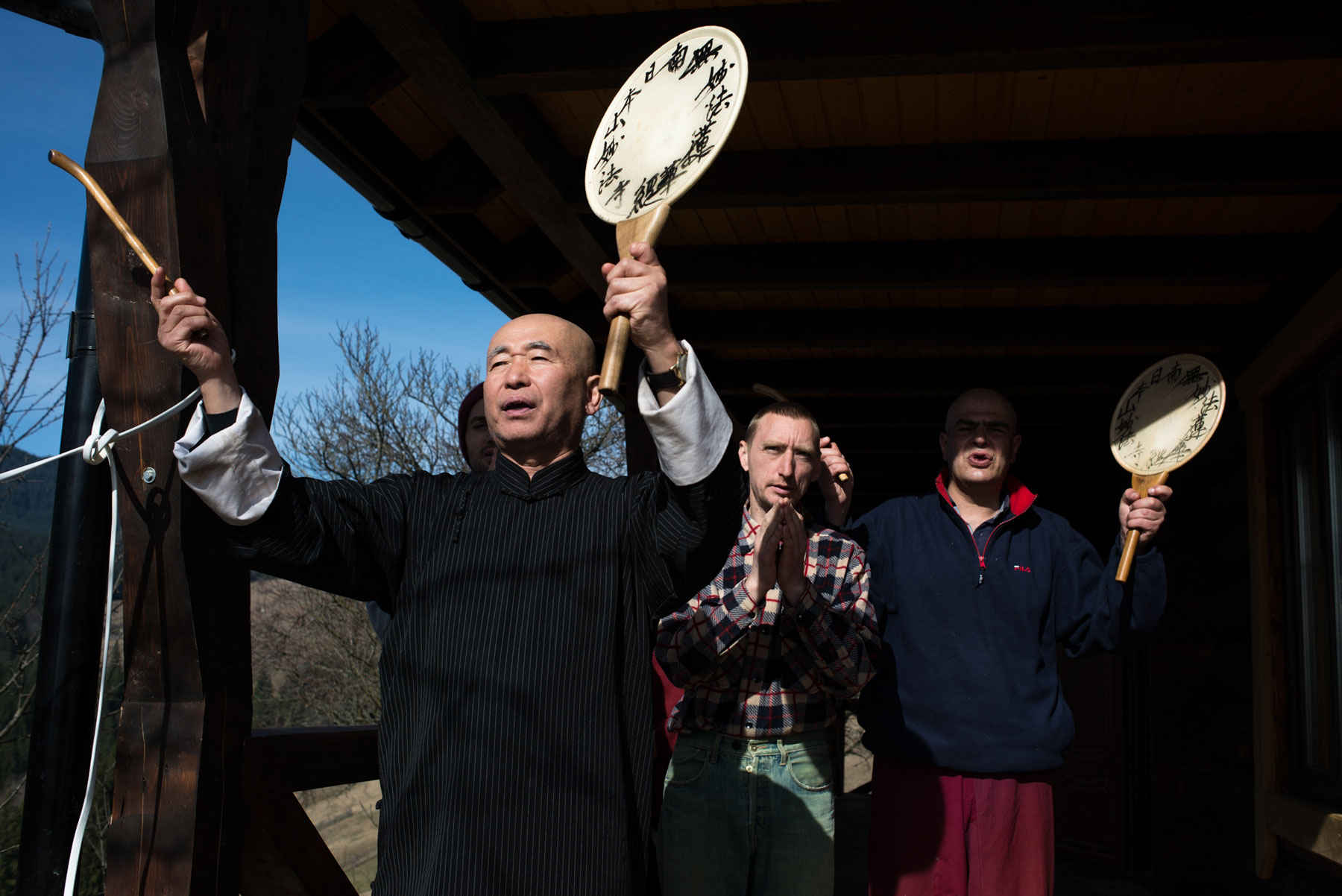
Residing in Slobozhanshchyna, the members of the Buddhist community traveled the world a lot, especially to the Himalayas. Serhiy confessed that in Donbas people perceived them differently, some people even teased them: Krishna go into mine, though ironically there are real miners among the monks. However, Buddhists do not divide people into “own kind” and “outsiders”, that is why Filonenko expresses a middle position on a complex issue of “east-west”:
— I see that Ukrainians have something in common. And they have more in common than differences. Differences are in character, language and all other things. People do not differ that much deep inside.
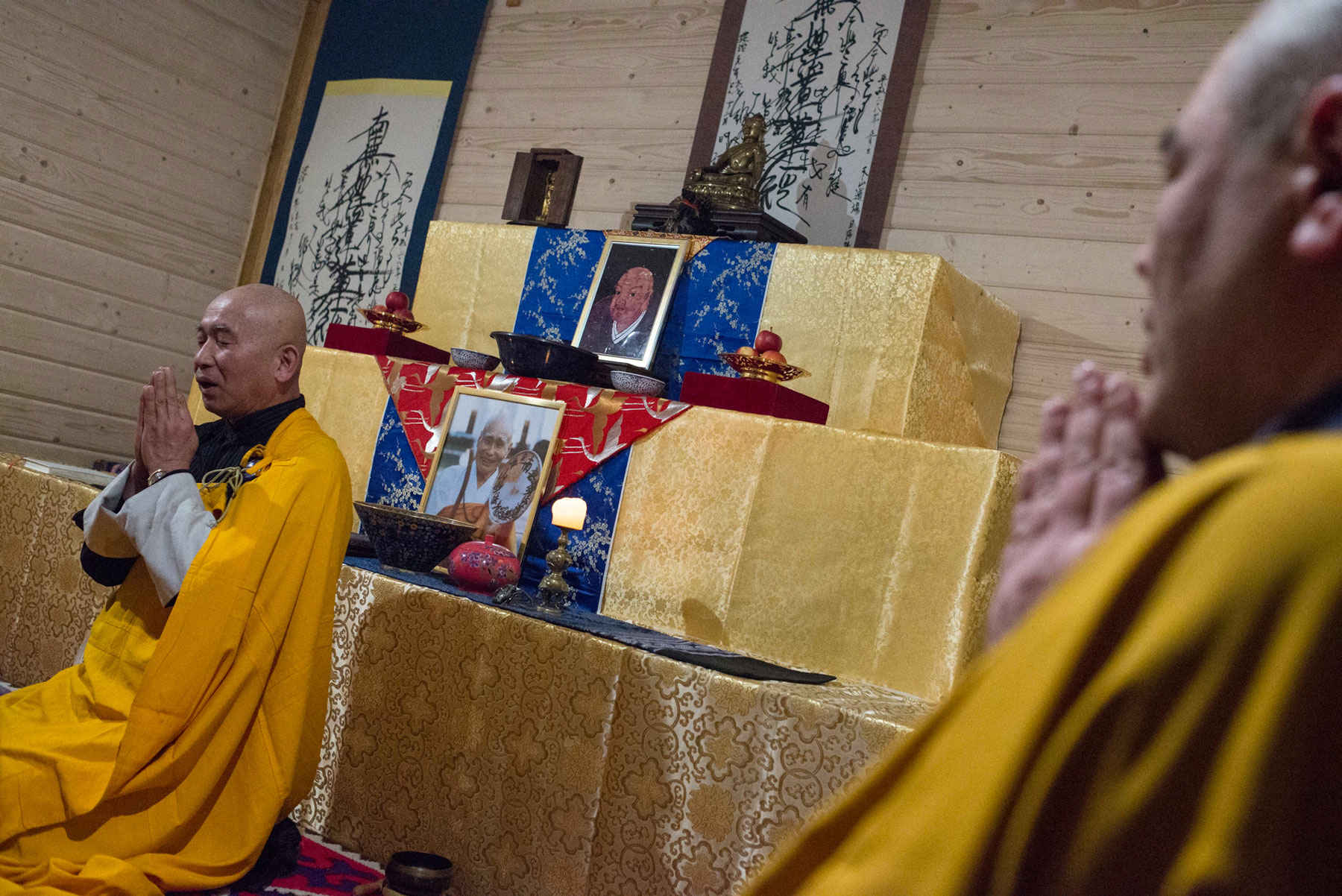
Buddhism is a pacifist religion, that is why in the world view of every disciple are absent such notions like “enemy” and a feeling of hatred:
— In my consciousness it never happens that I consider someone a stranger. I am not a very open person by character, but I do not have enemies. I do not have hatred towards anyone, I do not hate people that took away my Donbas, let’s put it this way. I live there, it was my family, my homeland, and now I cannot go there, but I do not have hatred towards those people. I see that they are simply sick, you know? If a doctor hated sick people…
The war interrupted the construction of the Sacred Mound of Peace, that the monks were erecting on the hill next to the Siverskyi Donets, and made them search other “places of power”. At first, following the advice of the Mentor Terasawa Junsei, the monks bought a house on the Dnipro river bank in Cherkasy region, and part of the community remained there.
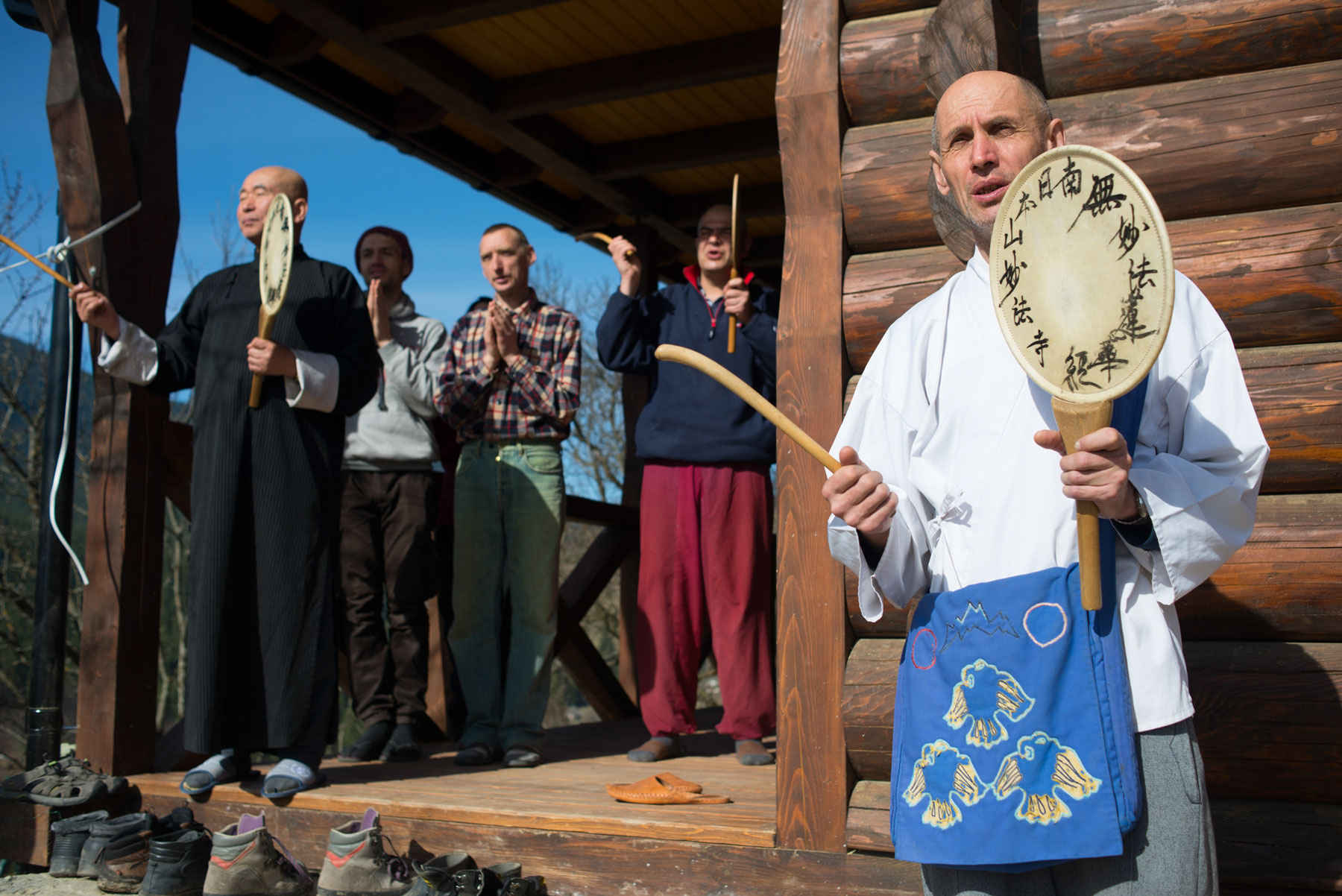
Place of the Way
In the Carpathians the disciples of the order have been staying for more than a year. Serhiy says that to call their settlement or the house in which they meditate a shrine would be wrong:
— We call it “Place of the Way”. It is “dōjō” in Japanese. “Do” stands for “dao” or “way”, and “jo” stands for “place”. Together they make “Place of the Way”. By the way, those who practice karate or kendo also call their places (for trainings — editor) “dōjō”. They also practice their way: the way of sword or the way of karate. “Dōjō”.
slideshow
In the Carpathians the search for suitable location lasted longer. However, when the location was agreed upon, instead of old Hutsul house, that was impossible to keep preserved, the monks built a new one in just seven months and started their life anew. They are planning to make a traditional Buddhist garden in Japaneese style in the yard later on:
— We have been looking throughout the Carpathians for almost three years, as well as in Zakarpattia, but our Mentor was not much into that. However, last time we came to Verkhovyna. He liked local landscapes: from Kryvopillia heights up to Verkhovyna. Iltsi and Kryvopillia have very softly shaped mountains and pleasing views. So we started looking here, we looked through many different plots, but did not see anything to our liking. Then, when we were on the way back and were crossing the Kryvopillia heights, a big deer crossed our way and Sansey said that it was a sign that the spirit of the forest pointed us where to be. And we started to look around and finally dwelled here.
Serhiy tells that at first local people treated with caution the newcomers with unusual faith. There were even problems with local nationalists and orthodox community, but with time people got used to and accepted the Buddhists on their land. The monk is convinced that if to communicate with people they open up and stop being hostile towards strangers:
— Saleswoman tells me, “Aren’t Hutsuls indeed the best people in the world?”. I tell her, “I wouldn’t say so, I saw many others”. I tell her, “Well, for example, people of Caucasus are also highlanders, but way more hospitable. They welcome you right in, and you… I am here for quite a long time and you haven’t invited me yet.” And she says back, “Anyways, we are great!”
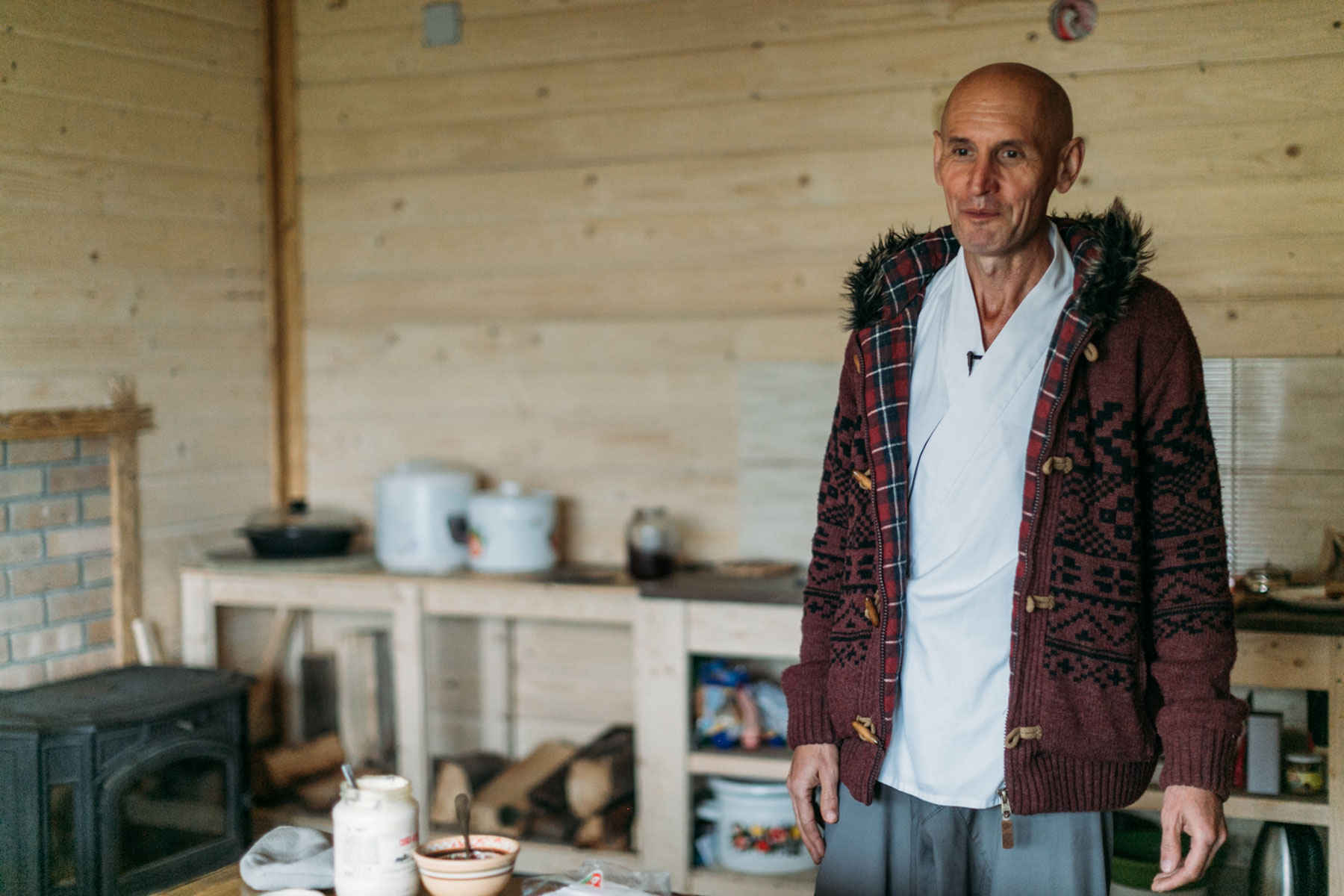
Serhiy goes to Kryvopillia village very seldom: once a week to get some groceries or for some other errands. Though if not a necessity, he says, he would not descend at all. Generally, with neighbors, salespeople and other local people the monks communicate often and without any problems: they greet everyone, do not wish to live in complete isolation from the world that exists outside the notion “Sangha” (harmony — editor):
— Some people understand that it is a prayer. They like that we meet the sun and see it off. They rejoice. There is one local man… he drinks a bit too much, but he is happy to hear our prayers, I like it. He does not need to be explained some complex things. It is not necessary. He just hears the prayer and knows that we meet the sun and that it is important. He is capable of feeling some depth, though he is a drunkard. That is what is great.
Currently, 20 monks reside on the mountain and all of them are old-timers of the Order. Serhiy hopes that with a move to a new place they will attain more followers since the religious practice should be supported, it is no good if everything ends up on them.
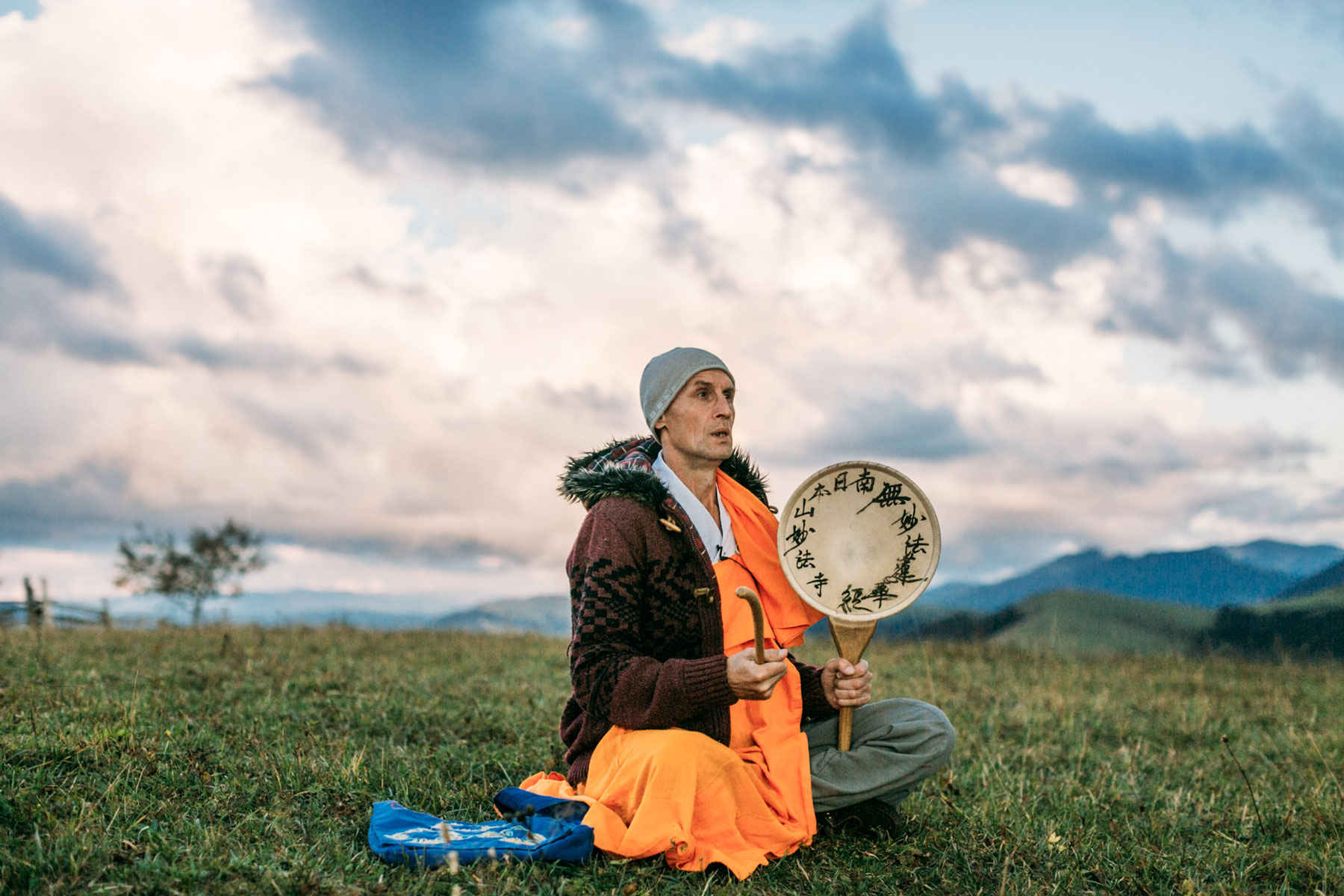
The Lotus Sutra Order
Serhiy Filonenko came to Buddhism during the times of the Perestroika. Back then he was married, and when he became a monk he was already 30 years old. During uncertain political times he got interested in eastern practices, read many books, but did not know what choice to make. A chance helped him to make up his mind when he wrote a letter to St. Petersburg datsan that was the biggest and the oldest center in USSR and later on he was invited to come. There an idea appeared to register in Donetsk the first Buddhist community in Ukraine. Since then Mentors started visiting them.
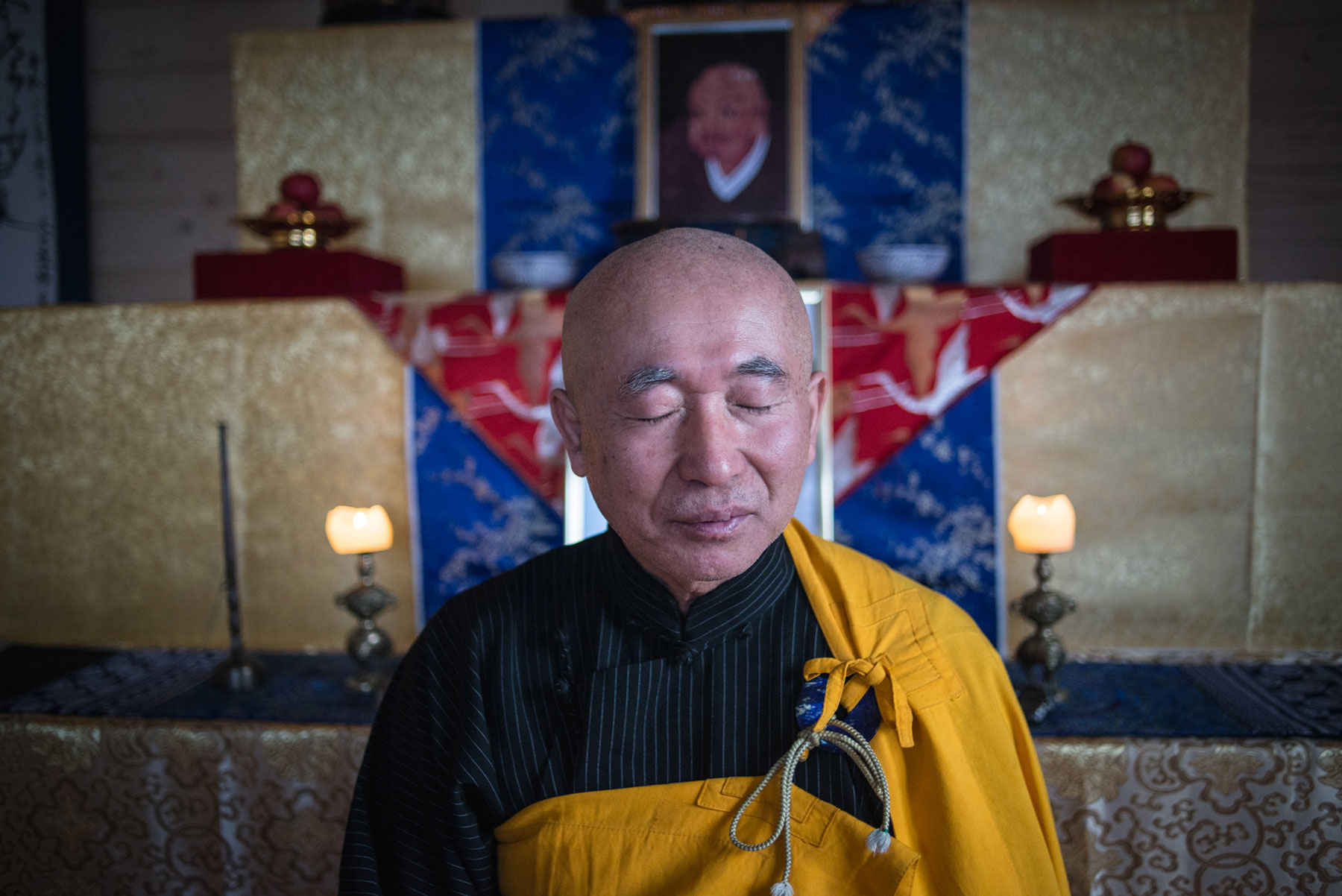
Among Ukrainian communities the most popular is Tibet line of Buddhism. The line the Serhiy belong to is called the Order of Lotos Sutra or the Order Nipponzan-Myōhōji, the mentor of the order is Sansei Terasawa Junsei. It is a far eastern buddhism that before reaching Ukraine made its way through Central Asia, China, Korea and finally got to Japan, where the mentor of Serhiy and other Ukrainian-speaking monks comes from. The personality of the Mentor has a great meaning, in particular, because he decides whom to give a chance of becoming a monk.
— We are not choosing something, we just met the Mentor. Actually this line (Nipponzan-Myōhōji – editor), is the oldest and the most developed. In general, Chinese Buddhism used to be the most powerful, before all those experiments. According to history Chinese Buddhism reached the highest level. However, Tibet Buddhism is very popular in the world. I think it is simply a fashion. It is the same doctrine, you see, the same Mentor Buddha, but there are many aspects to it.
According to Serhiy, there is no official hierarchy in Buddhism like in other religions of the world. Even Dalai Lama is an ordinary monk just like anyone else. Monks differ from one another only by the age and experience, since those who are older have gained more wisdom and deserve respect of others:
— The older ones sit down closer to the altar, closer to the Mentor, and the younger ones sit down on the other side. However, the Mentor puts them round himself in order to develop them, spend more time with them.
slideshow
Everyday the Carpathian monks fulfill religious practices. At six o’clock in the morning if the weather is fine they climb the mountain and start the ceremony: they meet the sun with a special prayer. After coming back to the house, they complete the morning ritual with a Lotus Sutra that is read mostly in Russian, there is also partial translation into Ukrainian. Then the monks get to household activities: cook food, clean up and finish some tasks. The Buddhists try to find at least two hours every day for individual learning: reading of philosophical and scientific texts, learning languages, etc. The day is concluded by an evening ceremony. To pray in harmony with nature is the main aim of conducting religious practices:
— We have a beautiful mountain of Kostrycha. A beautiful view on Chornohora mountain range opens up from there. It would be great to go there once a week and to pray to the world around, to the Carpathians, and to the whole universe.
Besides generally accepted prayer practices, the order of Lotus Sutra is famous for its peacekeeping activities. Serhiy says that the representatives of Tibet buddhism often take part in political campaigns:
— When between India and Pakistan there was tension and nuclear war was on the brim of break out, our Mentor organized a march of peace. It was in 2002. It was not like we took flags ourselves and started marching on, not at all! It was on the level of states. In Pakistan there was support from politicians and generals, there was security. It was strongly supported in India as well. Many people welcomed us and it was shown in mass media. We did it with belief that our prayer could help stop it. We were explaining what the truth is, that Buddha’s teaching united the land long before Islam came there.
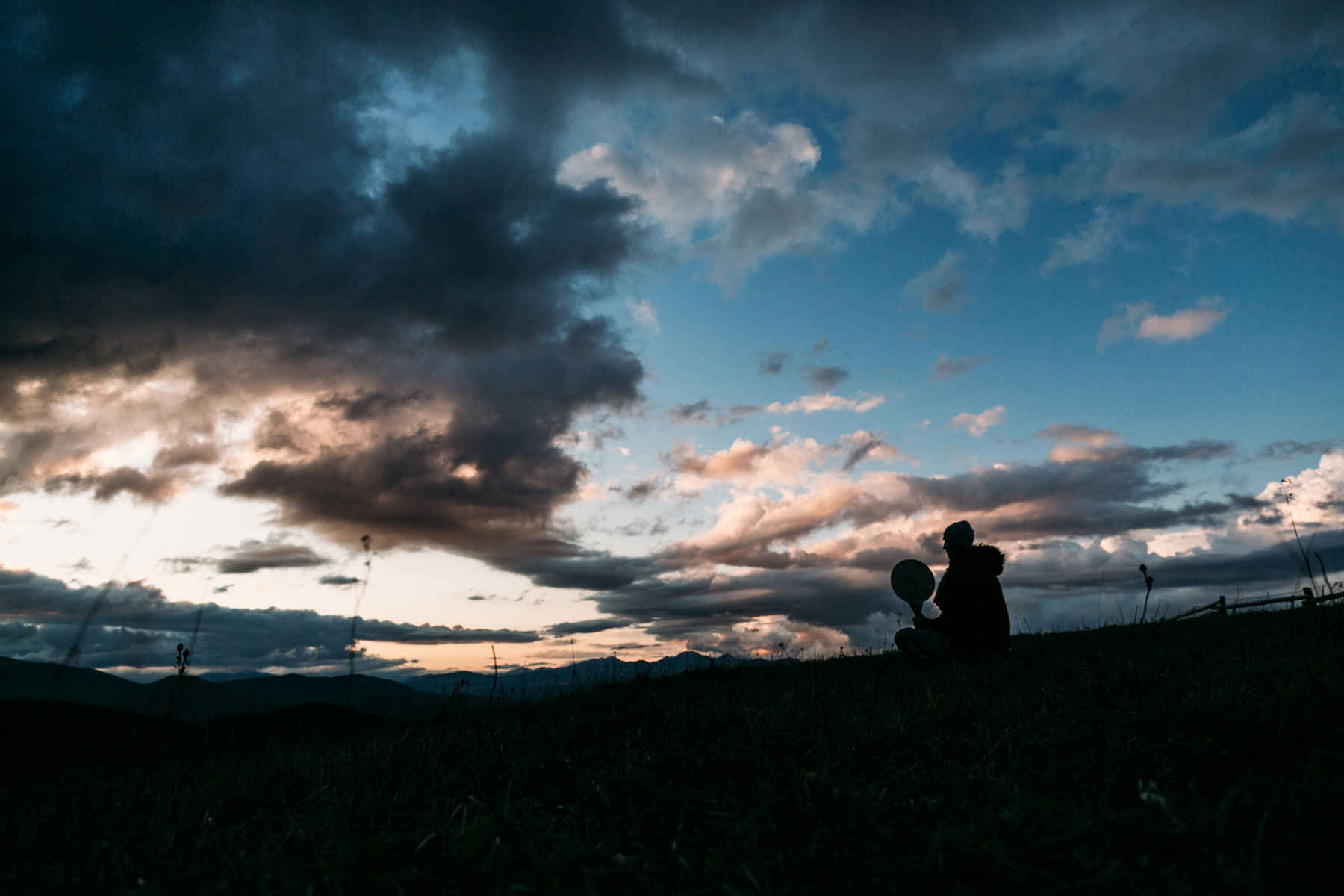
Ukrainian Buddhists have connections with other religious communities, namely with Islam. The mentor Terasawa Junsei was at the head of many peacekeeping initiatives. He wrote a letter to Saddam Khuseyn with a request to save Iraq by resigning the authority of presidency and moving to another country. Headed by the Sansey the monks also went to Chechnya, when the conflict with Russia got toughened again. In Serhiy’s opinion, it was canonical Islam that lead to tragic outcome on its territory:
— Chechens are Sufis, do you know about it? They are traditionally Sufis, but then… Right before our eyes it started happening. The canonical Islam was brought there and it ruined Chechnya, because this is very aggressive branch of Islam and it is not native to Chechens.
Serhiy is worried about current geopolitical situation on the planet. Buddhism believes in notions of cycle and changeability: our Universe is expanding and, eventually, it would disappear in order to give beginning to a new cycle of life. They believe that humanity is not progressing, but, on the contrary, it is heading to its logical end. According to this statement the period of human history is the last stage in this cycle of existence.
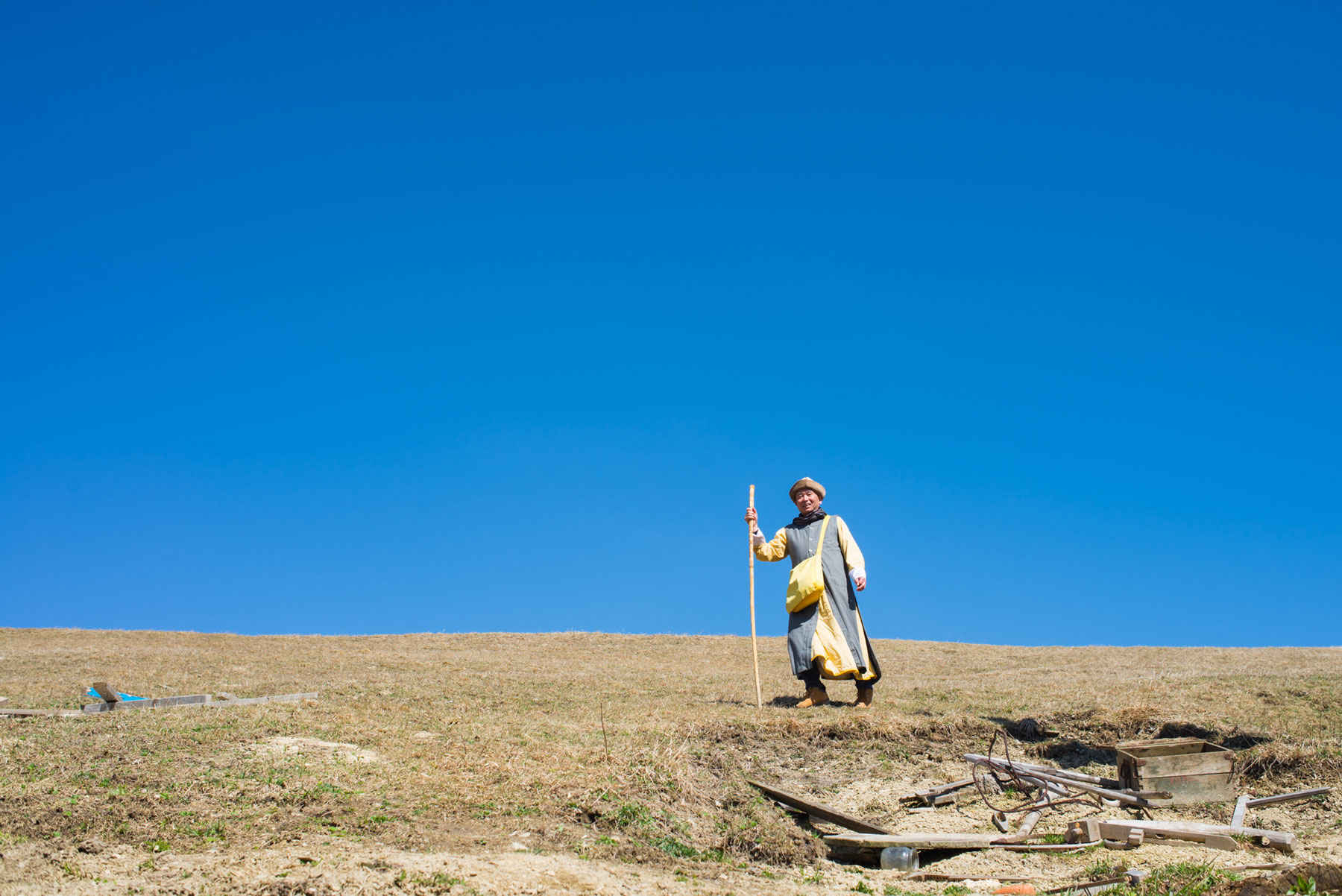
History and faith
Despite numerous trips around Europe and Asia, Serhiy cannot name any other place where he could live besides Ukraine. In his opinion, the South America was interesting before it was discovered by the Europeans since indians had “universal wisdom”, but now this part of the planet is not attractive to him anymore. Europe is also not suitable for Buddhists’ residence. The best micro climate for Buddhism practicing is in Asia, since people have retained their ancient attitude to the world:
— I like it here, in Ukraine, I do not have such thoughts when somebody has gone somewhere and i think to myself, “Oh! I would go there right now!”
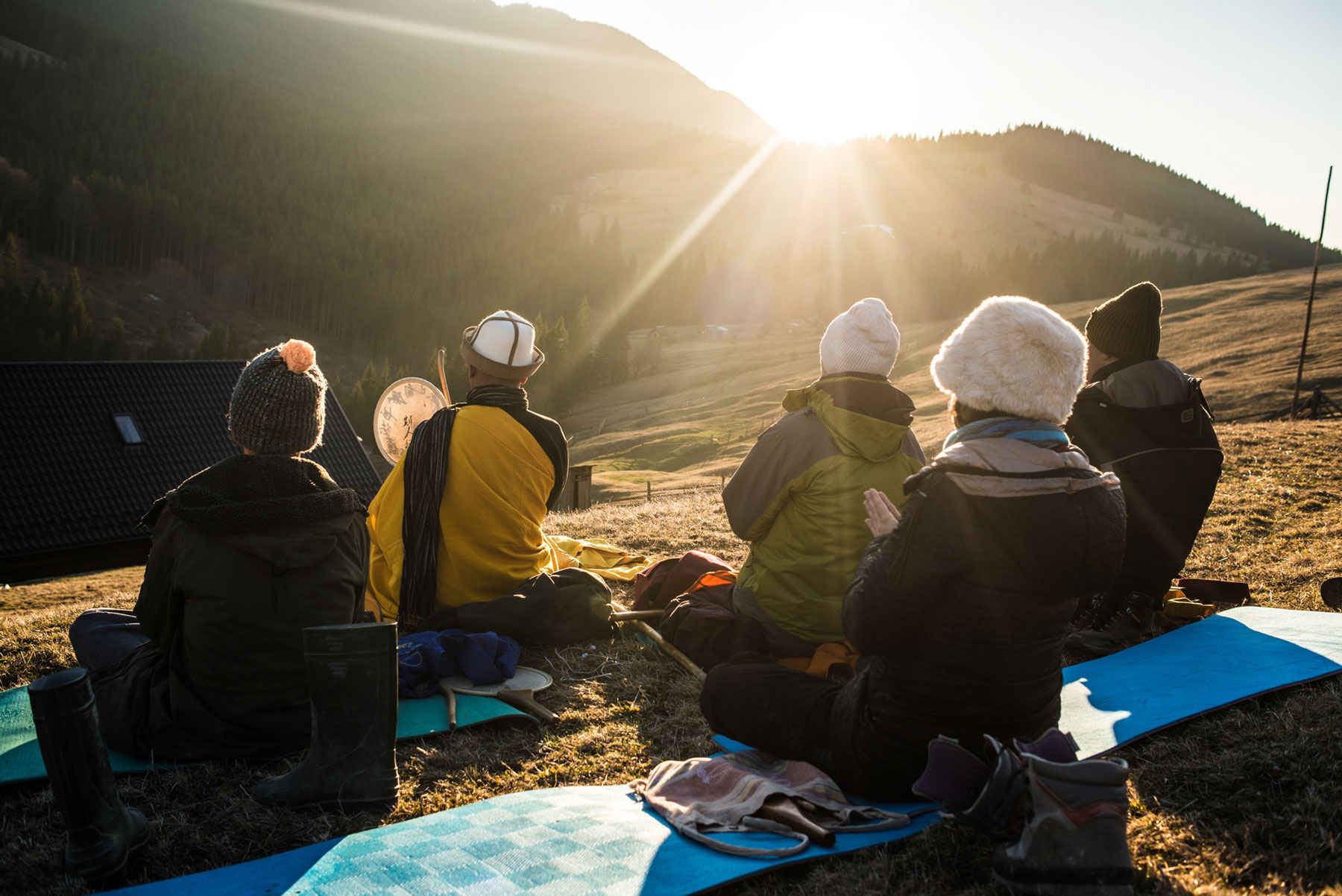
It is without doubt that their faith is the most precious thing that has Serhiy and religious people like him. For Buddhist monk believes not into soul salvation, but that he can change the world just like Buddha or Jesus Christ. Due to the faith, monks can open different truths, sometimes even historical ones:
— I can see in Ukraine some important roots. Our Mentor opened it to us. We (not that we are proud), we feel that we have discovered something important. It is Scythian age, you know? History of Scythians is very important period not only for Ukraine, but for the whole Asia and Eurasia. They were real heroes. They could sacrifice own life for each other. This trait of character got somewhat transferred to cossacks. Cossacks inherited this spirit, but in Scythians this spirit was from the Universe.
By opening new outlook, one always enriches own one. After having talked to Serhiy Filonenko, one understands that even detached, as commonly believed, Buddhists have some kind of patriotism though it is rooted into notions “cosmicity” and “unity”:
— I would like our Ukrainian people to be more united, so that they knew how to build the state, because our people do not know it yet, it seems to me. And that some kind of depth opened, you know? I do feel it that our country has very deep roots, and they are genuine. But everything that is going on is like foam, you see? Just a foam on the surface. And the depth… it is not discovered yet. When Maydan happened, here was this sensation a bit, but it is slipping away again.
After all, having overcome the way from the steppes of Slobozhanshchyna to the mountain ranges of the Carpathians, a couple of dozen of people keep carrying the prayer and believe into the world salvation. Numbers do not matter in such cases. Serhiy says that it is enough to have 4 monks so that a community could be created and the wisdom could be retained for descendants:
— This way sprouts up through you and all the powers of the universe sprout up too. That is why we are capable of changing this world. Even a single person. Jesus was by himself, and Buddha was by himself, too. Anyone can change. This teaching is for saving the world. It is not for self-improvement or achievement of some levels, no it’s not! It is for saving other people, the world, own country. That’s what it is for.

